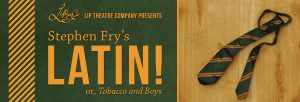Latin! Or Tobacco and Boys
 Since his six years as Rector during the 1990s, Stephen Fry has had many kind things to say about Dundee University. Given that the University awarded him an honorary doctorate in 1995 and named its student association bar after his novel The Liar, the feeling is clearly mutual. It is no surprise then that the University’s LIP Theatre Company (of whom Fry is honorary president) chose his early play Latin! Or Tobacco and Boys as its latest production.
Since his six years as Rector during the 1990s, Stephen Fry has had many kind things to say about Dundee University. Given that the University awarded him an honorary doctorate in 1995 and named its student association bar after his novel The Liar, the feeling is clearly mutual. It is no surprise then that the University’s LIP Theatre Company (of whom Fry is honorary president) chose his early play Latin! Or Tobacco and Boys as its latest production.
Fry may not be quite so well-known as a playwright, but having written and starred in Latin!, he and the Cambridge University Mummers took it to the Edinburgh Fringe in 1980, where it won a Fringe First. The play concerns Dominic Clark (played by Rob Currie), the young and inexperienced Latin master at Chartham Park Preparatory School for Boys. Despairing of his pupils ever mastering the classics, Dominic hatches a plan to become headmaster. Senior master Herbert Brookshaw (played by David Llewellyn) has other ideas and when he uncovers one of Dominic’s indiscretions. A tale of blackmail and hypocrisy ensues.
The play is mostly a two hander, but a series of interspersed monologues –think Joyce Grenfell, but darker- delivered by the teachers at a class of schoolboy characters “played” by unsuspecting members of the audience, made everyone sit up from the start. This device allowed for trademark Fry put downs – pity the latecomers confronted with “No, please, take your time”- and the two actors interacted with the audience to great effect. The symbolism of the pupils, denied a voice, was both comic and tragic as when Dominic enquires:
Does anyone know where Hopkins is?
[Silence]
Does anyone know how he died?
Sarcastic teachers made cynical by the apathy of their pupils and the misguided priorities of their superiors may not be entirely original, but two heartfelt performances kept the audience engaged. David Llewellyn had the harder acting job, and while he did not wholly convince as the older master, he was watchable throughout, having particular fun with some of the play’s racier lines. Rob Currie more fully embodied the awkward Dominic, showing his hope and despair in an understated way that did much to make his character sympathetic, even in the light of some unsavoury revelations. The staging of the play in Mono, a basement bar, helped create a dark bunker of a classroom which contributed well to an oppressive atmosphere. Lighting was also used effectively to contrast the boisterous classroom scenes with the darker, private conversations. Overall, it must be said that LIP did a more than decent job with the material.
For all Fry’s humour, it does feel an immature work, with even the two part title flagging up that this is a play which does not know what it wants to be. On the one hand, bleak humour is used to pose difficult questions about education, repressed sexuality and what might be lurking beneath the surface of the English public school system. On the other hand, the scenes that are played more obviously for laughs and a dubiously redemptive ending make for a jarring mixture of tones. I also have to say that I have issues with how it deals with the scenario of a paedophile teacher taking sexual advantage and then running off with a 13 year old pupil.
Still, reservations about the play aside, LIP should be applauded for having the courage to take on something that bit different. A glance at their list of recent productions – with stalwarts like Arthur Miller sitting alongside improvised comedy, new writing and lesser known plays like this – suggests a theatre company that is as adventurous as it is prolific. As a recent newcomer to theatre in Dundee, I will await their next performance with a great deal of interest.
Stephen Carruthers

Leave a Reply